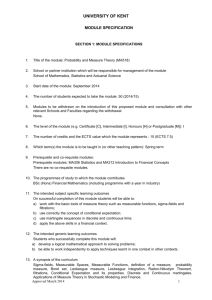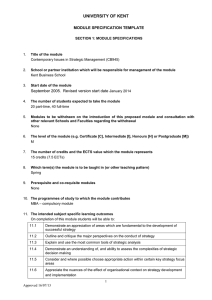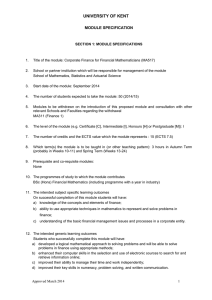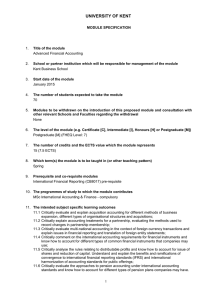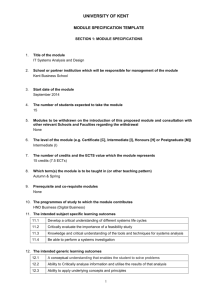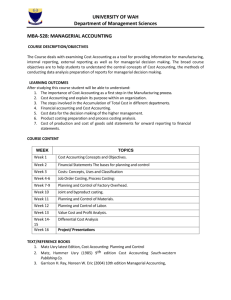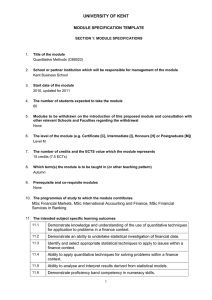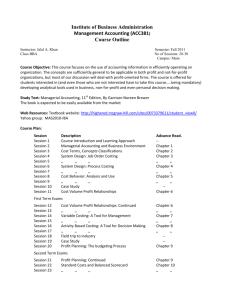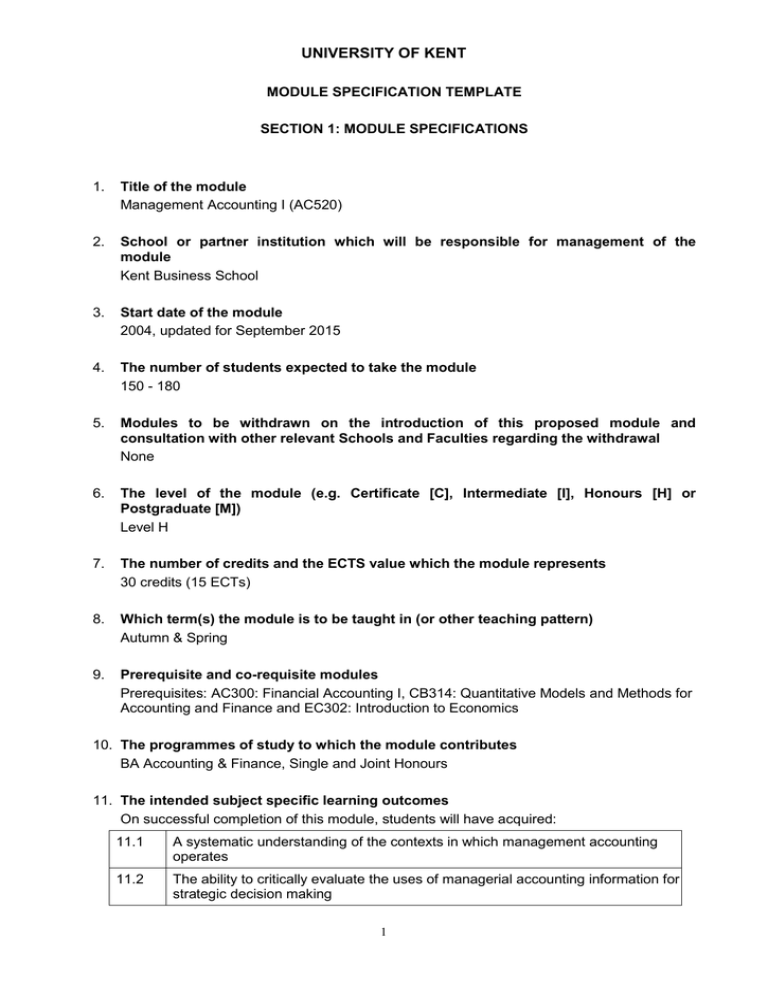
UNIVERSITY OF KENT
MODULE SPECIFICATION TEMPLATE
SECTION 1: MODULE SPECIFICATIONS
1.
Title of the module
Management Accounting I (AC520)
2.
School or partner institution which will be responsible for management of the
module
Kent Business School
3.
Start date of the module
2004, updated for September 2015
4.
The number of students expected to take the module
150 - 180
5.
Modules to be withdrawn on the introduction of this proposed module and
consultation with other relevant Schools and Faculties regarding the withdrawal
None
6.
The level of the module (e.g. Certificate [C], Intermediate [I], Honours [H] or
Postgraduate [M])
Level H
7.
The number of credits and the ECTS value which the module represents
30 credits (15 ECTs)
8.
Which term(s) the module is to be taught in (or other teaching pattern)
Autumn & Spring
9.
Prerequisite and co-requisite modules
Prerequisites: AC300: Financial Accounting I, CB314: Quantitative Models and Methods for
Accounting and Finance and EC302: Introduction to Economics
10. The programmes of study to which the module contributes
BA Accounting & Finance, Single and Joint Honours
11. The intended subject specific learning outcomes
On successful completion of this module, students will have acquired:
11.1
A systematic understanding of the contexts in which management accounting
operates
11.2
The ability to critically evaluate the uses of managerial accounting information for
strategic decision making
1
UNIVERSITY OF KENT
11.3
A systematic understanding of the current technical language and practices of
management accounting.
11.4
The ability to record and summarise economic events through the preparation of
profit and loss accounts for management purposes
11.5
A systematic understanding of various costing systems in management accounting
and cost allocation for supporting strategic managerial decisions
11.6
The ability to design and prepare budgets and perform variance analysis for
strategic planning and control
12. The intended generic learning outcomes
On successful completion of this module, students will have acquired the:
Ability to communicate and learn effectively using information technology.
12.1
12.2
Ability to analyse the operations of business and prepare financial projections.
12.3
Ability to manage their own learning, and to make use of scholarly reviews and
primary sources (e.g. refereed research articles and/or original materials
appropriate to the discipline
12.4
Ability to critically evaluate arguments, assumptions, abstract concepts and data
(that may be incomplete), to make judgements, and to frame appropriate questions
to achieve a solution to a problem
13. A synopsis of the curriculum
The work of accountants permeates all aspects of management and accountants provide
information that is relevant for both managers and external stakeholders in the context of
planning and controlling an organisation. This module will introduce and develop the
principles and techniques used to provide appropriate financial information for managers to
enable them to make better informed decisions. Topics may include:
An introduction to management accounting
The role of management accountants in an organisation
Cost terms and purposes
Cost determination
Cost-Volume-Profit (CVP) analysis
Measuring relevant costs & revenues for decision making
Job order costing
Cost allocation
Activity based costing
Joint and by-product costing
Pricing, target costing and customer profitability analysis
Motivation, budgets and responsibility accounting
Flexible budgets, variances and management control
Value based management and strategic management
Performance management and management control
Environment cost accounting: Sustainability
2
UNIVERSITY OF KENT
14. Indicative Reading List
Recommended text:
Seal, Garrison, Noreen (2012) Managerial Accounting 4rd Edition London: McGraw-Hill
Bhamini, Horngren, Data, Rajan (2012) Management and Cost Accounting 5th edition
London: FT-Prentice Hall
Drury (2012) Management and Cost Accounting 8th Edition Independence, Kentucky:
Cengage Learning ISBN 978-1-84480-566-2 (2012)
Atkinson, Kaplan, Matsumura and Young (2007) Management Accounting London: Pearson
Prentice Hall
15. Learning and Teaching Methods, including the nature and number of contact hours
and the total study hours which will be expected of students, and how these relate to
achievement of the intended module learning outcomes:
This module delivers 44 hours of lectures at 2 hours per week and 21 hours of seminars at
1 hour per week. Key topics are introduced in lectures. Examples and exercises are also
worked through in lectures in preparation for seminar work. Seminars present solutions to
pre-set seminar questions and lead discussions on designated topics.
Hours Subject LOs
Generic LOs
Lectures
44
11.1 – 11.6
12.1, 12.2, 12.4 & 12.5
Seminars
21
11.1 – 11.6
12.1, 12.2, 12.4
Other Self-Managed
Learning
235
11.1 – 11.6
12.1 – 12.4
Total hours
300
16. Assessment methods and how these relate to testing achievement of the intended
module learning outcomes
Weighting
Subject LOs
Generic LOs
Examination – 3 hour closed-book
70%
11.1 – 11.6
12.2, 12.4
In class test
10%
11.1 – 11.6
12.2, 12.4
Essay topic research and planning
– 1200-1500 words
10%
11.1 – 11.6
12.1, 12.3, 12.4
VLE test
10%
11.1 – 11.6
12.1, 12.4
3
UNIVERSITY OF KENT
The module will be assessed by both an end of year examination (70%) and coursework.
(30%). 66.7% of the coursework weighting will be test-based
The coursework consists of three elements:
An in-class test: The in-class test will consist of questions under time-constrained
conditions to give students practice in deploying management accounting
techniques in a timely fashion.
An essay topic research and planning (a full essay is not required) assignment: it
assesses student’s ability to demonstrate knowledge and understanding of the
contextual and conceptual features of management accounting, and their ability to
critically evaluate arguments and evidence. 1200 – 1500 words
A VLE test: it consists of mainly multiple choice questions and some computational
questions using VLE.
17. Implications for learning resources, including staff, library, IT and space
None
18. The School recognises and has embedded the expectations of current disability
equality legislation, and supports students with a declared disability or special
educational need in its teaching. Within this module we will make reasonable
adjustments wherever necessary, including additional or substitute materials,
teaching modes or assessment methods for students who have declared and
discussed their learning support needs. Arrangements for students with declared
disabilities will be made on an individual basis, in consultation with the University’s
disability/dyslexia support service, and specialist support will be provided where
needed.
19. Campus(es) where module will be delivered:
Canterbury
Module Specification Template
Last updated October 2014
4

